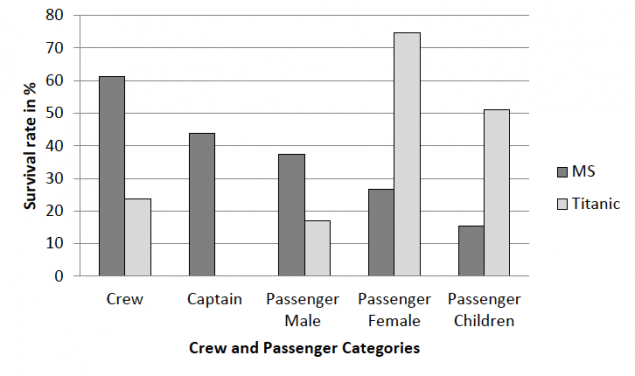Catastrophe In The Heart Of The Sea
Editor’s Note: This article was originally published by gCaptain in 2016 and is being republished now because it’s lessons are timeless and possibly more relevant in 2022 as today’s ships...

Updated: August 8, 2012 (Originally published July 31, 2012)

Researchers from Sweden’s Uppsala University have recently released some findings of a rather interesting study that dispel popular beliefs dating back to the Titanic about the anatomy of shipwreck survival.
According to the study, titled “Every Man for Himself: Gender, Norms and Survival in Maritime Disasters“, researchers found that in the case of a maritime disaster the age-old ‘women and children first’ does not hold, and in reality is more like ‘every man for himself’. In fact, women and children have substantially lower chance of survival than men, particularly than that of the captain and crew, the study finds.
In order to come to this conclusion the study’s authors, economists Mikael Elinder and Oscar Erixson, analyzed data based on 18 of the most notable shipwrecks during the period 1852 to 2011 with information on the fates of more than 15,000 people with one, well two, critical-yet-obvious exceptions; the RMS Titanic and RMS Lusitania. Why not include these? Simply put, the Titanic (and RMS Lusitania) disasters were exceptional.
The report states that on the ships where the captain gave the order ‘women and children first’, i.e. Titanic and Lusitania, the difference in survival rates between men and women is lower, but the study found that women survived to a higher extent than men only when this order was enforced by the threat of violence. This, however, is rare and by including the two aforementioned exceptions the results get severely skewed.
Specifically, the study shows that women have a significantly lower chance of survival than men (17.8% vs. 34.5%), children have the lowest chance of survival, and captain and crew are 18.7% more likely to survive than passengers.
But why are crew members more likely to survive?
Here’s the real zinger. The study found that, and we’re pretty sure some of you will disagree here, it is actually common that captains leave the ship and save themselves before overseeing the safe rescue of all passengers. Remember they said it not me, IT IS COMMON TO HAVE CAPTAINS AND CREW SAVE THEMSELVES BEFORE PASSENGERS.
Therefore, according to the study anyway, our favorite scapegoat Captain Francesco Schettino in the case of the Costa Concordia disaster is not at all an exception, but rather quite common in maritime disasters.
So what does this study mean?
Well, according to the reports findings, this indicates an important role of leaders in the face of disasters, and more widely, how this contributes to our understanding of how people behave under extreme stress and when it is a matter of life and death.

Download Paper: Every Man for Himself: Gender, Norms and Survival in Maritime Disasters

Sign up for gCaptain’s newsletter and never miss an update

Subscribe to gCaptain Daily and stay informed with the latest global maritime and offshore news
Essential news coupled with the finest maritime content sourced from across the globe.
Sign Up